|
|
|
Sort Order |
|
|
|
Items / Page
|
|
|
|
|
|
|
| Srl | Item |
| 1 |
ID:
096195
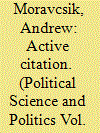

|
|
|
|
|
| Publication |
2010.
|
| Summary/Abstract |
Qualitative research dominates political science. In the field of international relations (IR), for example, about 70% of scholars primarily employ qualitative methods, compared to 21% favoring formal or quantitative analysis (Jordan et al. 2009). Since nearly all of the latter make secondary use of textual and historical methods, overall over 90% of IR scholars employ qualitative analysis, whereas 48% use any statistical and only 12% any formal methods. This understates the dominance of qualitative analysis, for many statistical data sets rest ultimately on historical work, and IR scholars, when polled, report that qualitative case studies are more relevant for policy than quantitative or formal work. Hardly any major IR debate-whether that over the end of the cold war, American unipolarity, Chinese foreign policy, the nature of European integration, compliance with international law, democratic peace, the causes of war, or the impact of human rights norms-remains untouched by important qualitative contributions.
|
|
|
|
|
|
|
|
|
|
|
|
|
|
|
|
| 2 |
ID:
167866
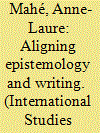

|
|
|
|
|
| Summary/Abstract |
This article examines writing as the last link in the epistemology-theory-methodology alignment. Although political scientists dedicate a great deal of their time to writing, conversations on this topic remain scarce within international relations and political science overall. Notably absent are analyses of the actual writing choices scholars make and what these mean for the knowledge they produce. This article uses the tools of literary analysis to take a closer look at the mechanics of three published academic articles in the fields of international relations and comparative politics. It focuses on how qualitative interviews are written, demonstrates how authors can conceal or reveal the dialogical dimension, and examines how they deal with the conundrum of the representation of research participants. This kind of reflexive analysis reveals the epistemological foundations of a given research article and can be used to identify instances of misrepresentation and misalignment. As such, it is an important tool for the improvement of academic writing.
|
|
|
|
|
|
|
|
|
|
|
|
|
|
|
|
| 3 |
ID:
181136
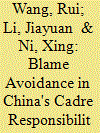

|
|
|
|
|
| Summary/Abstract |
This article contends that prior research on the behaviour of Chinese local cadres pays limited attention to their motivation for avoiding blame. Using qualitative data from three field studies conducted in Guangdong province, the study focuses on blame avoidance in the cadre responsibility system, which is recognized as an important instrument for state capacity building. Our analysis uncovers three major discursive strategies used by grassroots cadres to manage blame either before or after it is apportioned: de-legitimating performance standards, re-attributing blame and transferring blame risk. We find that local cadres have a role as blame makers in shifting blame and accusations. This finding challenges the conventional view, which typically sees local officials as blame takers. The article concludes by elaborating on the wider implications of this finding and proposing avenues for future research.
|
|
|
|
|
|
|
|
|
|
|
|
|
|
|
|
| 4 |
ID:
165698
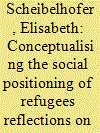

|
|
|
|
|
| Summary/Abstract |
Presently, European and other countries are facing public (and scholarly) discussions surrounding the possibilities of successfully integrating refugees into their respective national labour markets. Such debates often disregard the complex circumstances under which refugees are received in a given nation-state. For this conceptually oriented article, we draw on the example of Austria as a receiving state, as it shares many characteristics with other receiving nation-states in the global north. Theoretically, we base our argument on the assumption that societies are socially unequal. Such inequality is institutionally co-constructed, as we will show in this article. Yet empirical examples assist in understanding how refugees are also actors who are not only exposed to such institutional and varying social environments. Rather, they also reinforce and/or change these circumstances by their own agency.
|
|
|
|
|
|
|
|
|
|
|
|
|
|
|
|
| 5 |
ID:
081789
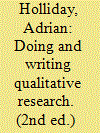

|
|
|
|
|
| Edition |
2nd ed.
|
| Publication |
London, Sage Publications, 2007.
|
| Description |
xiv, 199p.
|
| Standard Number |
9781412911306
|
|
|
|
|
|
|
|
|
|
|
|
Copies: C:1/I:0,R:0,Q:0
Circulation
| Accession# | Call# | Current Location | Status | Policy | Location |
| 053469 | 001.4/HOL 053469 | Main | On Shelf | General | |
|
|
|
|
| 6 |
ID:
086451
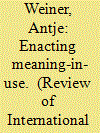

|
|
|
|
|
| Publication |
2009.
|
| Summary/Abstract |
This article proposes a framework for empirical research on contested meaning of norms in international politics. The goal is to identify a design for empirical research to examine associative connotations of norms that come to the fore when norms are contested in situations of governance beyond-the-state and especially in crises. If cultural practices shape experience and expectations, they need to be identified and made 'account-able' based on empirical research. To that end, the proposed qualitative approach centres on individually enacted meaning-in-use. The framework comprises norm-types, conditions of contestation, types of divergence and opposition-deriving as a specific interview evaluation technique. Section one situates the problem of contestation in the field of constructivist research on norms. Section two introduces distinctive conditions of contestation and types of norms. Section three details the methodology of conducting and evaluating interviews and presents the technique of opposition-deriving with a view to reconstructing the structure of meaning-in-use. Section four concludes with an outlook to follow-up research.
|
|
|
|
|
|
|
|
|
|
|
|
|
|
|
|
| 7 |
ID:
173125
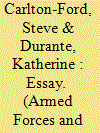

|
|
|
|
|
| Summary/Abstract |
“The Soldier, the State, and the People—Costs and Benefits of Military Regimes”: Evaluating the Essay “Guns and Butter: Child Mortality and the Mediators of Militarization” raises several concerns about the theory and analyses in our article. We address what we see as the three most important: (1) the necessity of both qualitative and quantitative analyses in the study of militarization; (2) correlational versus causal analysis; and (3) the value of Huntington’s analysis of praetorian militarization. We have varying levels of agreement.
|
|
|
|
|
|
|
|
|
|
|
|
|
|
|
|
| 8 |
ID:
178710
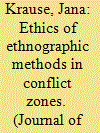

|
|
|
|
|
| Summary/Abstract |
This article examines the ethics of using ethnographic methods in contemporary conflict zones. Ethnographic research is an embodied research practice of immersion within a field site whereby researchers use ethnographic sensibility to study how people make sense of their world. Feminist, conflict and peacebuilding scholars who research vulnerable populations and local dynamics especially value ethnographic approaches for their emphasis on contextual understanding, human agency, egalitarian research relationships and researcher empathy. While immersion leads to knowledge that can hardly be replaced by using more formal approaches, it also elicits ethical dilemmas. These arise not only from the specific research context but also from who the researcher is and how they may navigate violent and often misogynous settings. I argue that many dilemmas may and perhaps should not be overcome by researcher skill and perseverance. Instead, ethical challenges may lead researchers to adopt limited and/or uneven immersion in their field site, not as failed or flawed ethnography but as an ethical research strategy that incorporates ethnographic sensibility to a varying extent. Examining why researchers may opt for limited and uneven immersion is important because in conflict research, stereotypes of the intrepid (male) researcher with a neutral gaze still tend to mute open discussions of how gender, race, ethnicity, nationality, class and other background factors inevitably shape immersion. This article seeks to contribute to creating discursive space for these conversations, which are vital for researchers to analyse, reflect and write from the position of a ‘vulnerable observer’ and incorporate greater transparency in the discussion of research findings.
|
|
|
|
|
|
|
|
|
|
|
|
|
|
|
|
| 9 |
ID:
166517
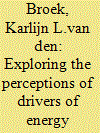

|
|
|
|
|
| Summary/Abstract |
Many models have been applied to predict energy use and savings, yet few studies have investigated people's own perceptions of what drives their energy use. Understanding these perceptions can help design energy policy that is likely to be trusted and perceived as credible. This study assessed the perception of the drivers of energy use among young adults, who had recently become independent energy consumers, but were not yet paying for their energy bills. Focus groups were conducted in which the drivers of energy use were discussed, and discussions were analysed using a framework of a successful existing behavioural model – the Comprehensive Action Determination Model – that includes both conscious and unconscious drivers of energy consumption. The findings show (1) participants did not tend to believe they saved energy to conserve the environment, (2) adherence to egoistic values, apparent in the lack of motivation to save energy in the absence of financial incentives, and (3) strong awareness of energy habits. Policy makers targeting young adults' energy use are advised how to align energy policy with these perceptions.
|
|
|
|
|
|
|
|
|
|
|
|
|
|
|
|
| 10 |
ID:
184428
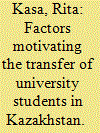

|
|
|
|
|
| Summary/Abstract |
The theoretical frameworks developed for, and applied to, the study of student transfer between higher education institutions build on evidence from Western contexts, specifically the United States. The current article contributes to understanding factors that drive student transfer in the Central Asian context, specifically that of Kazakhstan. Through inductive coding of qualitative interviews with undergraduate transfer students in Kazakhstan, this research identifies student-centred factors of social embeddedness, parental influence in higher education decision-making, evolving career choice awareness, strategies for academic success, the quality of teaching and relationship ethics with students. While these factors influencing student transfer in Kazakhstan align with the existing Western context-based literature, the data in this research offer a localized perspective on what these factors mean in the context of a contemporary Central Asian country.
|
|
|
|
|
|
|
|
|
|
|
|
|
|
|
|
| 11 |
ID:
150719


|
|
|
|
|
| Summary/Abstract |
The likely installation of, and potential energy savings from, low carbon technologies in domestic buildings is not only dependent on those who fit them, but also the broader supply chains of which they are part. Despite this, the role of supply chain actors has been largely overlooked in strategies seeking to encourage the installation of more sustainable domestic heating technologies. With reference to central heating, this paper responds through an ethnographic analysis of how plumbers' merchants and sales representatives can influence the work of heating installers in the United Kingdom. It applies two dimensions of the concept of ‘social capital’: relational and structural. Relational social capital focuses on the trust, loyalty and reciprocity at play in relations, whilst structural social capital considers how the strength of tie can influence those to whom people turn for advice and support. Together, these ideas demonstrate how relationships amongst these groups can serve to influence product choice and facilitate information exchange. The paper concludes by discussing how these supply chains might be engaged with as a means of encouraging the installation of low carbon domestic technologies.
|
|
|
|
|
|
|
|
|
|
|
|
|
|
|
|
| 12 |
ID:
099742
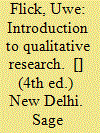

|
|
|
|
|
| Edition |
4th ed.
|
| Publication |
New Delhi, Sage Publications, 2009.
|
| Description |
xvi, 504p.
|
| Standard Number |
9788132105688
|
|
|
|
|
|
|
|
|
|
|
|
Copies: C:1/I:0,R:0,Q:0
Circulation
| Accession# | Call# | Current Location | Status | Policy | Location |
| 055409 | 300.72/FLI 055409 | Main | On Shelf | General | |
|
|
|
|
| 13 |
ID:
167829
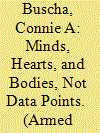

|
|
|
|
|
| Summary/Abstract |
Harris, McDonald, and Sparks’s recent quantitative research article, Sexual Harassment in the Military: Individual Experiences, Demographics, and Organizational Contexts, does not deliver its title’s promises. In 2018, social science research investigating, describing, and, ultimately, impacting human lives has advanced beyond overly simplistic figures of data points on x- and y-axes and rhetorical findings. Therefore, this response challenges numerous aspects of Harris, McDonald, and Sparks’s article. It identifies pragmatism as a valuable theoretical perspective from which to investigate the phenomenon of sexual harassment in the military. It further asserts that a qualitative methodology best provides rich, nuanced, and descriptive data from which researchers and scholars can identify measures to mitigate negative experiences for all service members regardless of gender.
|
|
|
|
|
|
|
|
|
|
|
|
|
|
|
|
| 14 |
ID:
191920
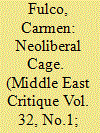

|
|
|
|
|
| Summary/Abstract |
On the occasion of Tunisia’s 2019 legislative and presidential elections, politics witnessed the proliferation of distinct varieties of populism that culminated in the electoral victory of the current president, Kais Saied. This article argues that the Kais Saied phenomenon inscribes into a Tunisian ‘populist moment’ that found fertile terrain in the protraction of the socioeconomic crisis and the absence of a radical critique of the neoliberal order. Although Kais Saied proposed an alternative to traditional politics in his electoral campaign, he did not seem likely to shake the foundations on which Tunisia’s neoliberal cage has been built. Rather, an empirical analysis of the context of his ascent suggests that populism à la Kais Saied surfaced as the by-product of an unquestioned neoliberal order, reinforced by the political elite of the post-Arab Uprisings period.
|
|
|
|
|
|
|
|
|
|
|
|
|
|
|
|
| 15 |
ID:
167580
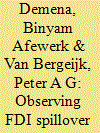

|
|
|
|
|
| Summary/Abstract |
We observe and analyse three intra-industry foreign direct investment (FDI) spillover transmission channels using unique firm-level data collected from on-site interviews and observations regarding domestic and foreign firms operating in Uganda in 2015. Our main results are: (1) the spillover effects mainly depend on the channel(s) by which they occur (the competition channel is most important while spillover benefits through the worker mobility and the imitation channels are less prevalent) and (2) both positive and negative spillover effects occur within the same channel and, moreover, effects differ by channel for the same case. These are novel and challenging findings that have not yet been recognised in theoretical and empirical research on FDI spillovers. Our results suggest that long-term pecuniary spillover effects are predominantly stimulated via the competition channel and show that only limited short-term and long-term technological spillover effects occur through the imitation and the movement of workers channels. These channels are not only less prevalent, but also appear to be constrained by competition-determined spillovers. We are confident that these directions for future research will have a high pay-off because, as shown by this exploratory fieldwork, a more complete picture of the spillover effects is reached when the channels are considered simultaneously.
|
|
|
|
|
|
|
|
|
|
|
|
|
|
|
|
| 16 |
ID:
160947
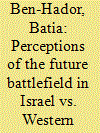

|
|
|
|
|
| Summary/Abstract |
In the post-heroic era, features of warfare have dramatically changed in Western armies, but what about the future? This study focuses on the perceptions of commanders and experts from Israel versus those of commanders and experts from three Western countries (UK, Sweden and the US) regarding the challenges those armies will face in the future battlefield, at both the macro and micro level. This examination can lay a foundation for understanding the differences in the perceptions of the challenges that Israel and other countries are facing and to identify the major issues that must be considered in the discussion about the future battlefield. Most of the respondents found it difficult to anticipate the future. However, the Israeli narrative of the future was different from the narratives in the other countries. Qualitative analysis has exposed four factors of future battlefield perceptions: the characteristics of conflicts, macro-social factors, information and technology, and unit and command. In the Israeli context, complexity was perceived as a difficulty and even as a threat.
|
|
|
|
|
|
|
|
|
|
|
|
|
|
|
|
| 17 |
ID:
076088
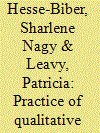

|
|
|
|
|
| Publication |
London, Sage Publications, 2005.
|
| Description |
x, 404p.
|
| Standard Number |
0761928278
|
|
|
|
|
|
|
|
|
|
|
|
Copies: C:1/I:0,R:0,Q:0
Circulation
| Accession# | Call# | Current Location | Status | Policy | Location |
| 052228 | 001.42/HES 052228 | Main | On Shelf | General | |
|
|
|
|
| 18 |
ID:
167113


|
|
|
|
|
| Summary/Abstract |
Ghana implemented the National Health Insurance Scheme (NHIS) in 2005 with the intention of providing residents with quality affordable healthcare. Over the past few years, concerns have been raised about the quality of healthcare clients receive. This study assesses the experiences of NHIS subscribers with the quality of care they receive under the scheme by both private and public hospitals. The results from the 56 interviews show that the majority of the subscribers were dissatisfied with the overall quality of healthcare they received in both private and public hospital because of the long waiting hours, the poor attitude of nurses and the demand for payment of additional money. Even though clients who visited the private hospital paid for all services, excluding consultation, their level of satisfaction with the quality of healthcare was relatively higher than those who visited the public hospital. The paper concludes that NHIS clients do not receive the quality of healthcare the scheme promised, and this has implications for premium renewals and health-seeking behaviour.
|
|
|
|
|
|
|
|
|
|
|
|
|
|
|
|
| 19 |
ID:
188081
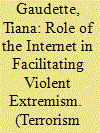

|
|
|
|
|
| Summary/Abstract |
While a growing body of evidence suggests that the Internet is a key facilitator of violent extremism, research in this area has rarely incorporated former extremists’ experiences with the Internet when they were involved in violent extremism. To address this gap, in-depth interviews were conducted with ten Canadian former right-wing extremists who were involved in violent racist skinhead groups, with interview questions provided by thirty Canadian law enforcement officials and ten community activists. Participants were asked about their use of the Internet and the connection between their on- and offline worlds during their involvement in the violent right-wing extremist movement. Overall, our study findings highlight the interplay between the Internet and violent extremism as well as the interactions between the on- and offline worlds of violent extremists. We conclude with a discussion of study limitations and avenues for future research.
|
|
|
|
|
|
|
|
|
|
|
|
|
|
|
|
| 20 |
ID:
159485
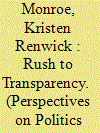

|
|
|
|
|
| Summary/Abstract |
What is the impact of the recent Data Access and Research Transparency (DA-RT) initiative and the Journal Editors Transparency Statement (JETS) on scholars working with qualitative data? Analysis finds DA-RT insufficiently sensitive to the needs of qualitative data and focuses on four inter-related reasons why DA-RT needs to be revised before being widely adopted by political science journals: (1) space constraints that hinder full journal presentation of the analysis of qualitative data; (2) ethical concerns about protecting human subjects, and the time needed to prepare such data before publicly sharing them; (3) costs of data collection and the right of first usage; and (4) a potentially chilling effect of DA-RT on certain types of research topics. Analysis of the author’s own journey from econometric and survey analysis to narrative interviews with people in vulnerable situations, facing moral dilemmas, illustrates why DA-RT needs additional safeguards for qualitative data and methods. Given the increasing importance of qualitative data, and its ability to lend insight into critical political topics, the author argues that implementing the current version of the DA-RT initiative could hinder political science’s ability to address important political questions. Thus DA-RT must be modified to address the special needs of qualitative data.
|
|
|
|
|
|
|
|
|
|
|
|
|
|
|
|
|
|
|
|
|